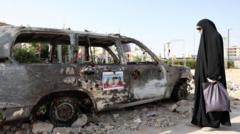Despite a cease-fire agreement reached under President Trump’s intervention, both Israel and Iran continued military strikes, raising concerns over the fragile peace settlement.**
Tensions Erupt as Israel and Iran Ignite Conflict Despite Trump’s Cease-Fire Announcement**

Tensions Erupt as Israel and Iran Ignite Conflict Despite Trump’s Cease-Fire Announcement**
President Trump expresses frustration over ongoing military actions by Israel and Iran, jeopardizing a recently announced cease-fire.**
June 24, 2025, 9:43 a.m. ET – President Trump’s announcement of a cease-fire between Israel and Iran appears to be on shaky ground as both nations resumed hostilities shortly after the agreement. In a candid and frustrated stance, Trump criticized both countries for their continuous attacks, suggesting disregard for the truce he brokered just hours earlier.
During a media briefing, Trump conveyed his irritation using explicit language, focusing particularly on Israel's military actions that resumed shortly after the cease-fire was announced. He accused Israel of excessive aggression stating they “dropped a load of bombs, the likes of which I’ve never seen before” immediately after the deal went into effect.
Tensions were high as Iran's military reportedly fired missiles into Israeli territories in the aftermath of the cease-fire announcement, but Iran has denied these allegations. In a counter-response, Israeli forces targeted significant strategic installations in Iran, raising concerns of escalating violence.
In telephonic discussions with Israeli Prime Minister Benjamin Netanyahu, Trump warned that continued aggression could signal major violations of the cease-fire. Netanyahu's office reported that retaliatory strikes had commenced, implying that military action would be tempered to uphold the truce, despite claims on both sides of continued fire.
World reactions have been cautious, with nations looking on as Trump embarks on a NATO summit, where discussions of peace and stability in the Middle East are likely to arise. As Iranian officials lauded what they claimed to be a military victory, there remains significant skepticism regarding the viability of long-lasting peace in the region.
The situation remains tense as residents of both nations cope with the repeated assaults and heightened fears of further conflict. Emergency responders in Israel have been mobilized in response to missile strikes while fears persist on whether the cease-fire will hold amidst ongoing hostilities. In this ever-shifting geopolitical landscape, the potential for renewed battles threatens any prospects for lasting negotiations between the two nations.
During a media briefing, Trump conveyed his irritation using explicit language, focusing particularly on Israel's military actions that resumed shortly after the cease-fire was announced. He accused Israel of excessive aggression stating they “dropped a load of bombs, the likes of which I’ve never seen before” immediately after the deal went into effect.
Tensions were high as Iran's military reportedly fired missiles into Israeli territories in the aftermath of the cease-fire announcement, but Iran has denied these allegations. In a counter-response, Israeli forces targeted significant strategic installations in Iran, raising concerns of escalating violence.
In telephonic discussions with Israeli Prime Minister Benjamin Netanyahu, Trump warned that continued aggression could signal major violations of the cease-fire. Netanyahu's office reported that retaliatory strikes had commenced, implying that military action would be tempered to uphold the truce, despite claims on both sides of continued fire.
World reactions have been cautious, with nations looking on as Trump embarks on a NATO summit, where discussions of peace and stability in the Middle East are likely to arise. As Iranian officials lauded what they claimed to be a military victory, there remains significant skepticism regarding the viability of long-lasting peace in the region.
The situation remains tense as residents of both nations cope with the repeated assaults and heightened fears of further conflict. Emergency responders in Israel have been mobilized in response to missile strikes while fears persist on whether the cease-fire will hold amidst ongoing hostilities. In this ever-shifting geopolitical landscape, the potential for renewed battles threatens any prospects for lasting negotiations between the two nations.























